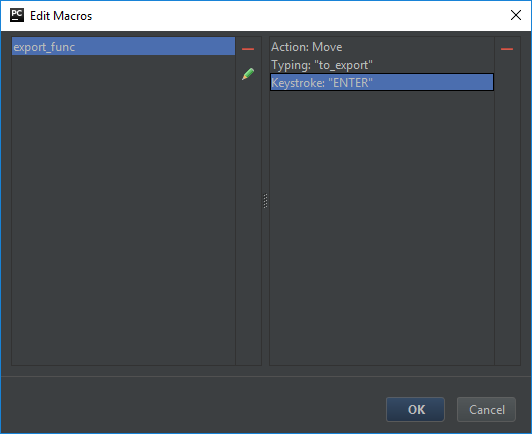If you just want the modules, you could just run the code and a new session and go through sys.modules for any module in your package.
To move all the dependencies with PyCharm, you could make a macro that moves a highlighted object to a predefined file, attach the macro to a keyboard shortcut and then quickly move any in-project imports recursively. For instance, I made a macro called export_func that moves a function to to_export.py and added a shortcut to F10:
![Macro Actions]()
Given a function that I want to move in a file like
from utils import factorize
def my_func():
print(factorize(100))
and utils.py looking something like
import numpy as np
from collections import Counter
import sys
if sys.version_info.major >= 3:
from functools import lru_cache
else:
from functools32 import lru_cache
PREPROC_CAP = int(1e6)
@lru_cache(10)
def get_primes(n):
n = int(n)
sieve = np.ones(n // 3 + (n % 6 == 2), dtype=np.bool)
for i in range(1, int(n ** 0.5) // 3 + 1):
if sieve[i]:
k = 3 * i + 1 | 1
sieve[k * k // 3::2 * k] = False
sieve[k * (k - 2 * (i & 1) + 4) // 3::2 * k] = False
return list(map(int, np.r_[2, 3, ((3 * np.nonzero(sieve)[0][1:] + 1) | 1)]))
@lru_cache(10)
def _get_primes_set(n):
return set(get_primes(n))
@lru_cache(int(1e6))
def factorize(value):
if value == 1:
return Counter()
if value < PREPROC_CAP and value in _get_primes_set(PREPROC_CAP):
return Counter([value])
for p in get_primes(PREPROC_CAP):
if p ** 2 > value:
break
if value % p == 0:
factors = factorize(value // p).copy()
factors[p] += 1
return factors
for p in range(PREPROC_CAP + 1, int(value ** .5) + 1, 2):
if value % p == 0:
factors = factorize(value // p).copy()
factors[p] += 1
return factors
return Counter([value])
I can highlight my_func and press F10 to create to_export.py:
from utils import factorize
def my_func():
print(factorize(100))
Highlighting factorize in to_export.py and hitting F10 gets
from collections import Counter
from functools import lru_cache
from utils import PREPROC_CAP, _get_primes_set, get_primes
def my_func():
print(factorize(100))
@lru_cache(int(1e6))
def factorize(value):
if value == 1:
return Counter()
if value < PREPROC_CAP and value in _get_primes_set(PREPROC_CAP):
return Counter([value])
for p in get_primes(PREPROC_CAP):
if p ** 2 > value:
break
if value % p == 0:
factors = factorize(value // p).copy()
factors[p] += 1
return factors
for p in range(PREPROC_CAP + 1, int(value ** .5) + 1, 2):
if value % p == 0:
factors = factorize(value // p).copy()
factors[p] += 1
return factors
return Counter([value])
Then highlighting each of PREPROC_CAP, _get_primes_set, and get_primes and
then pressing F10 gets
from collections import Counter
from functools import lru_cache
import numpy as np
def my_func():
print(factorize(100))
@lru_cache(int(1e6))
def factorize(value):
if value == 1:
return Counter()
if value < PREPROC_CAP and value in _get_primes_set(PREPROC_CAP):
return Counter([value])
for p in get_primes(PREPROC_CAP):
if p ** 2 > value:
break
if value % p == 0:
factors = factorize(value // p).copy()
factors[p] += 1
return factors
for p in range(PREPROC_CAP + 1, int(value ** .5) + 1, 2):
if value % p == 0:
factors = factorize(value // p).copy()
factors[p] += 1
return factors
return Counter([value])
PREPROC_CAP = int(1e6)
@lru_cache(10)
def _get_primes_set(n):
return set(get_primes(n))
@lru_cache(10)
def get_primes(n):
n = int(n)
sieve = np.ones(n // 3 + (n % 6 == 2), dtype=np.bool)
for i in range(1, int(n ** 0.5) // 3 + 1):
if sieve[i]:
k = 3 * i + 1 | 1
sieve[k * k // 3::2 * k] = False
sieve[k * (k - 2 * (i & 1) + 4) // 3::2 * k] = False
return list(map(int, np.r_[2, 3, ((3 * np.nonzero(sieve)[0][1:] + 1) | 1)]))
It goes pretty fast even if you have a lot of code that you're copying over.


from mymodule import func, and you don't use any global variables or duplicate any function names, then you could probably safely gather all the functions into a single script. If you normally useimport mymoduleand thenmymodule.func()then you could have the script create shell versions of each module with just the relevant functions. – Cove